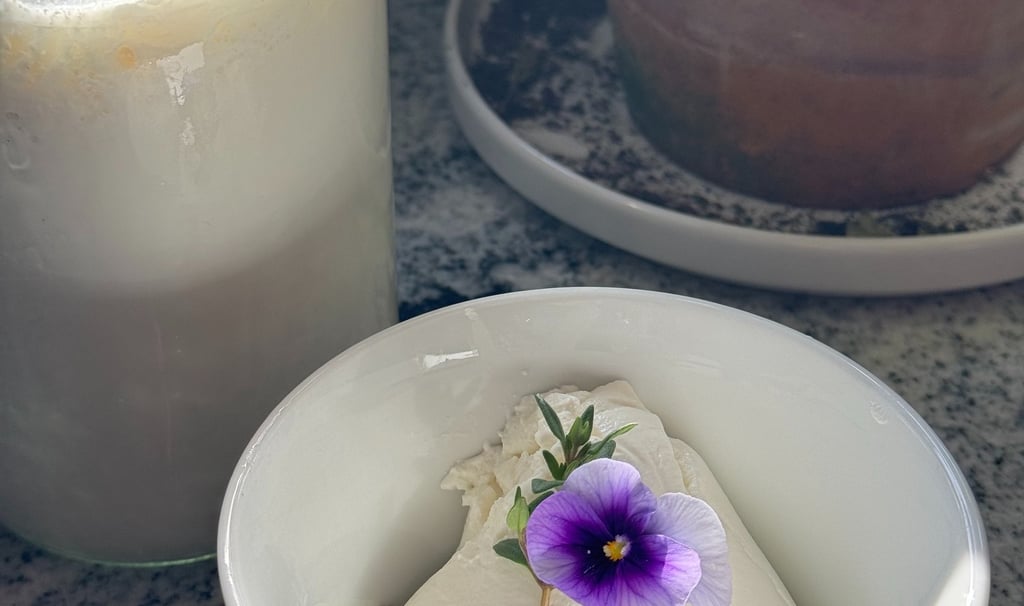Why Substituting Daily Recipes with Milk Kefir Can Be a Healthy Alternative
5/24/20243 min read


The Health Benefits of Milk Kefir
Milk kefir, a fermented dairy product with origins in the Caucasus Mountains, has been celebrated for centuries for its health-promoting properties. Traditionally made by fermenting cow, goat, or sheep milk with kefir grains, this beverage has become increasingly popular in modern diets due to its impressive nutritional profile and numerous health benefits.
Rich in probiotics, milk kefir is teeming with beneficial bacteria and yeast, which play a crucial role in maintaining a healthy gut flora. These probiotics aid in digestion, helping to break down food more efficiently and absorb nutrients more effectively. Regular consumption of milk kefir can alleviate symptoms of indigestion, bloating, and constipation, while also promoting overall digestive health.
Beyond its digestive benefits, milk kefir is a powerhouse of essential vitamins and minerals. It is an excellent source of vitamin B12, calcium, magnesium, and phosphorus, all of which are vital for maintaining strong bones and teeth, as well as supporting metabolic functions. Additionally, milk kefir contains bioactive compounds that have been shown to possess anti-inflammatory and antioxidant properties, potentially reducing the risk of chronic diseases.
One of the standout benefits of milk kefir is its potential to boost the immune system. The probiotics in milk kefir can enhance the body's natural defenses by modulating the immune response and inhibiting the growth of harmful bacteria. Furthermore, the presence of beneficial microbes in kefir can help lower cholesterol levels, thereby promoting heart health and reducing the risk of cardiovascular diseases.
For individuals with lactose intolerance, milk kefir offers a viable alternative. The fermentation process breaks down much of the lactose in the milk, making it easier to digest and less likely to cause discomfort. This makes milk kefir an excellent option for those who typically avoid dairy products due to lactose intolerance.
Overall, incorporating milk kefir into your daily diet can provide a multitude of health benefits, from improved digestion and a stronger immune system to better heart health and enhanced nutrient absorption. Whether consumed on its own or as part of various recipes, milk kefir stands out as a nutritious and versatile addition to any diet.
How to Make Kefir Cheese with Goat Milk
Creating kefir cheese with goat milk is a straightforward process that yields a delicious, versatile product. Begin by gathering your ingredients and equipment: you will need fresh goat milk, kefir grains, cheesecloth, a colander, and a fermentation jar.
Start by pouring the goat milk into a clean fermentation jar and adding the kefir grains. Cover the jar with a breathable cloth and secure it with a rubber band to prevent contamination. Allow the mixture to ferment at room temperature for 24-48 hours, depending on the ambient temperature and your taste preferences. Warmer conditions will accelerate the fermentation process.
Once the milk has thickened and developed a tangy flavor, it is time to separate the curds from the whey. Place a colander over a large bowl and line it with cheesecloth. Carefully pour the fermented milk into the cheesecloth-lined colander. The whey will drain into the bowl, leaving behind the curds. For a thicker cheese, allow the curds to drain for several hours or even overnight in the refrigerator.
Proper care of your kefir grains is essential for ongoing success. After straining, rinse the grains gently with non-chlorinated water and store them in fresh goat milk in the refrigerator if not immediately reusing. Optimal fermentation times will vary, but a balance of 24-48 hours usually achieves a desirable consistency and flavor.
To enhance the flavor of your kefir cheese, consider adding herbs, spices, or other ingredients. Fresh chives, garlic, dill, and even a touch of honey can create delightful variations. Incorporating kefir cheese into dishes is simple; it can be spread on bread, used in salads, or even blended into sauces for a creamy texture.
For safe consumption, always store kefir cheese in an airtight container in the refrigerator and consume within a week. Ensuring cleanliness throughout the process will help prevent contamination and preserve the quality of your cheese.
With these steps, you can enjoy the health benefits and unique taste of homemade kefir cheese made from goat milk.
